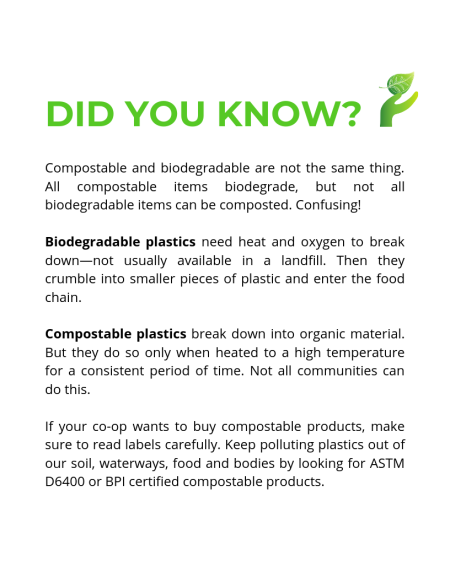Waste is a silent thief that takes bites out of your co-op’s bottom line without adding to your members’ comfort or making community life more enjoyable. Here are some tips on how your co-op can save money over time by wasting less.
1. If your co-op pays for garbage pick-up, but not for recycling and composting, remind members that spending a few minutes recycling and composting will save them money. Make recycling easier by …
- placing bins in your common areas and emptying them often.
- training members from time to time—not just at move-in—about what goes where (Aluminium foil? Pizza boxes? Milk cartons? Plastic bags?) to ensure that the recycling streams are pure. Communities differ. Some charge more than double for mixed waste (garbage that contains recyclable materials or recycling that includes materials that can’t be recycled). Others just dump “tainted” recycling into the landfill.
- recruiting a Green Team to come up with creative ways to encourage recycling and composting. A contest or a recycling demonstration at a general meeting could be fun. Just make sure the team stays positive. Becoming the co-op’s Garbage Police won’t win sustainability any friends.
- setting and publishing a schedule for collecting electronic and hazardous waste for delivery to your community’s collection depot. This includes batteries, lightbulbs, old cellphones, broken monitors and more.

2. Track your co-op’s success at reducing the garbage being collected. If your co-op improves its recycling and composting of smelly organic materials, you may be able to save money by scheduling less frequent garbage pick-up. Report regularly to members on your performance.
3. Replace paper towels in common-area washrooms with high-efficiency hand dryers.
4. Buy a set of sturdy washable dishes, glasses and flatware. Use them for co-op events in place of throw-outs.
5. Buy and use a co-op dishwasher for the dishes that have taken the place of disposables. This will save labour and water.
6. Replace standard lighting fixtures with LEDs, which go for years without needing new bulbs and use less energy.
7. Ask staff to consider bulk purchases if your co-op has storage space. This should mean less packaging.
8. When your co-op renovates, contact local processors of wood waste who accept debris for recycling.
9. Donate old furniture and office equipment. Reach out to Goodwill or another local charity shop for advice on who can use what you can’t.
10. Instead of dropping off a pile of minutes and reports, e-mail your directors an electronic board package. This will save staff time and paper.
BONUS IDEA
11. Instead of printing the materials for Members Meetings, can you e-mail them instead? Could this work for your co-op? If not now, maybe in a few years.